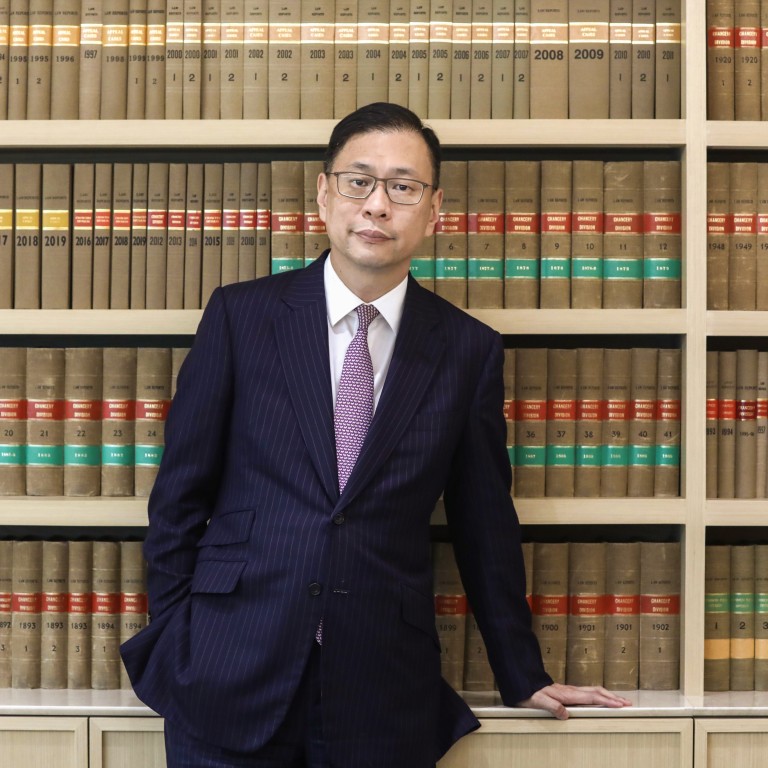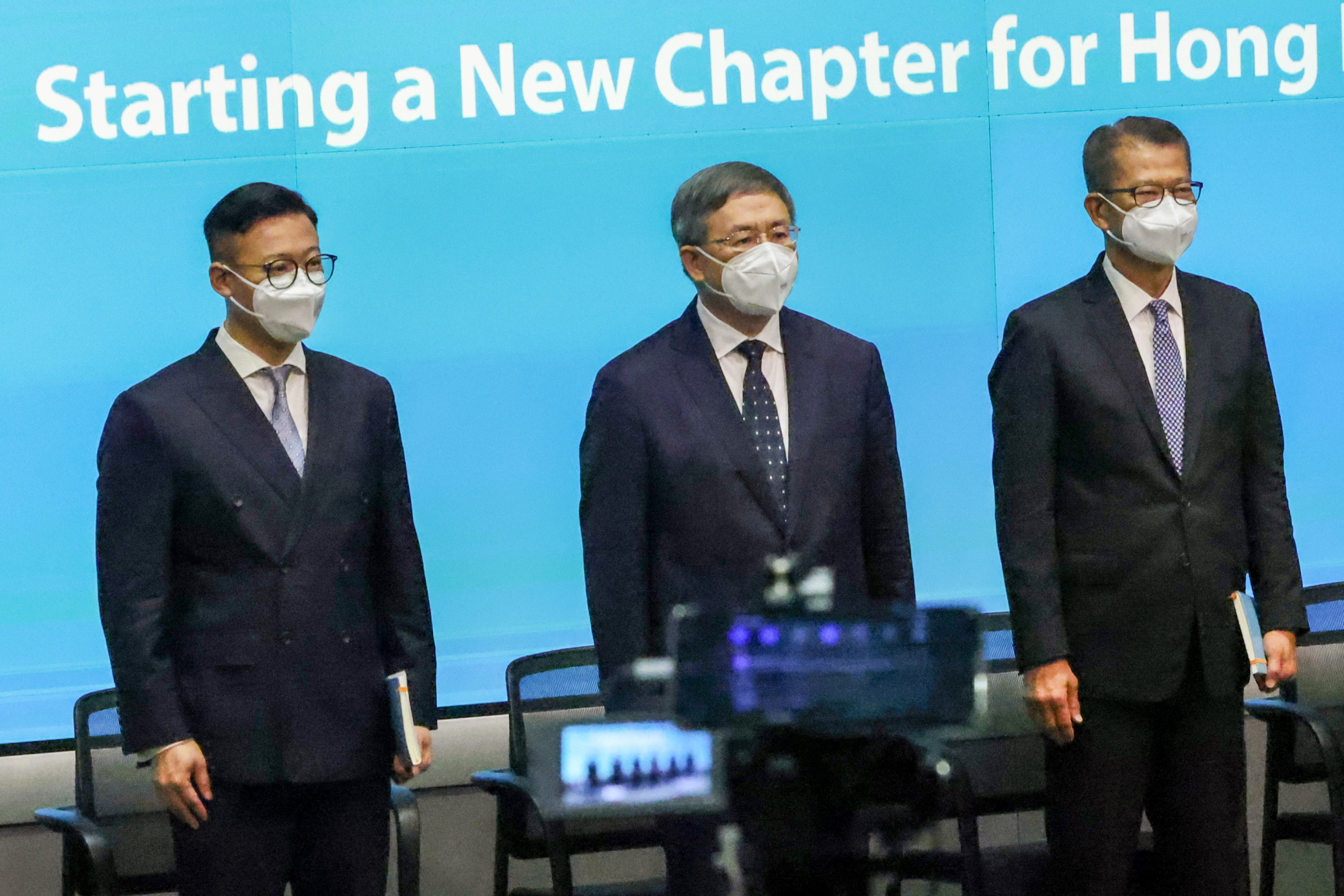
Hong Kong Bar Association head stresses importance of ‘public perception’ after incoming deputy justice minister retains party membership
- Remarks from Senior Counsel Victor Dawes come as role of incoming deputy secretary for justice in prosecutorial decisions remains undefined
- Solicitor-turned-lawmaker Horace Cheung has decided to remain a member of city’s largest pro-establishment party after appointment to incoming governing team
The head of the Hong Kong Bar Association has said “public perception is important” after it emerged the incoming deputy secretary for justice will retain membership of the city’s largest pro-establishment party, as it remained unclear if he would be involved in prosecution decisions.
The remarks by Senior Counsel Victor Dawes on Monday referred to the decision by Horace Cheung Kwok-kwan, a solicitor-turned-lawmaker, to remain a member of the Democratic Alliance for the Betterment and Progress of Hong Kong (DAB) after his appointment as the deputy to the incoming secretary for justice Paul Lam Ting-kwok.
Despite continuing to remain a DAB member, Cheung has resigned from his role as a legislator following his appointment.
Several politicians had previously continued to be members of political parties after being selected as ministers, such as former home affairs chief Caspar Tsui Ying-wai and Secretary for Financial Services and the Treasury Christopher Hui Ching-yu, both of the DAB.
However, the unique role played by the justice department has sparked debate on whether it would be appropriate for Cheung to do the same, especially when he could be involved in prosecution decisions.
But Dawes said he believed the incoming deputy secretary for justice was aware of such concerns and would act appropriately.
“At the end of the day, public perception is important and I am sure that [Cheung] is already very alive to that, and I am confident that he will do what is in the public interest,” he said.
A quick guide to who’s who on incoming team of Hong Kong leader John Lee
Dawes also said it was difficult to comment on the matter until the division of labour between the secretary for justice and the deputy – a post newly created under the new administration to be led by Chief Executive-designate John Lee Ka-chiu – was clearly laid down.
“I am sure it will be clarified,” he told the Post. “The [incoming] secretary for justice has already said that he will be ultimately responsible for decisions in respect of prosecutions.
“Given what has been said and given that he is assisted by the director of public prosecutions, I believe it is unlikely that the deputy secretary for justice will be involved in prosecution work.”
At a press conference on Sunday, Lam also pledged a clear division of labour between himself and Cheung, but said details would only be revealed following discussions with his colleagues when the justice minister took office.
None of Lam’s predecessors, namely Elsie Leung Oi-sie, Wong Yan-lung, Rimsky Yuen Kwok-keung and the incumbent Teresa Cheng Yeuk-wah, had held any party affiliation while in office. Leung opted to quit the DAB in February 1997 following her appointment as the city’s first post-handover justice minister.

On Monday, DAB veteran Tam Yiu-chung, the city’s sole delegate to China’s top legislative body, defended the decision by Cheung to retain his party membership, brushing aside concerns that it would undermine public perception.
“The prerequisite is ‘patriots governing Hong Kong’, no matter which political parties, groups or unions they are from,” Tam said, referring to the principle underscored by Beijing.
The delegate said it was the role of such political parties to “give up what one treasures” by providing talent such as Cheung, who was DAB’s vice-chairman, to work for the government.
The move by Cheung to hold onto his party membership was a symbolic gesture, Tam said, adding that it did not mean the incoming deputy minister would be biased towards his party.
Professor Simon Young Ngai-man, an associate dean of research at the University of Hong Kong’s law school, said that Article 63 of the Basic Law neither required the justice minister nor his deputy to refrain from holding membership in a political party.
The city’s mini-constitution also did not require either office-holder to refrain from making prosecutorial decisions if they were members of political parties, he said.
“It is ultimately a question and duty for the official to ensure that he is not subject to any political pressure when it comes to prosecutorial decisions,” Young said.
DAB’s Horace Cheung likely to be picked as Hong Kong’s deputy justice chief
The legal scholar added that the matter should be left up to each individual office-holder.
“For some, it may well be that refraining from engagement in political activities but maintaining party membership is sufficient, for others he or she may feel it is necessary to suspend his or her party membership whilst in public office,” he said.
Cheung has yet to respond to inquiries from the Post.
The Law Society, which represents the city’s solicitors, issued a statement on Monday congratulating Lam and Cheung on their appointments, saying it looked forward to working with the pair in promoting public understanding of the rule of law, as well as Hong Kong as an international legal hub.
The Bar Association also issued a similar statement, but only named Lam, saying it had confidence that the senior counsel would defend the city’s rule of law and judicial independence.
On Sunday, Beijing announced the appointment of Hong Kong’s principal officials to incoming leader Lee’s cabinet, hailing it as a “diversified team” while also laying down its expectations for the new administration to unite society and make “greater achievements”.
The line-up, formed under a massive government restructuring plan, would expand the present 13 bureaus to 15, and establish deputies for the chief secretary, financial secretary and secretary for justice.
Meanwhile, Secretary for Civil Service Patrick Nip Tak-kuen, a top aide to incumbent leader Carrie Lam Cheng Yuet-ngor who was not reappointed, refused to comment on whether Lee had invited him to stay on. He added that it was his honour to have served the public for 36 years.


